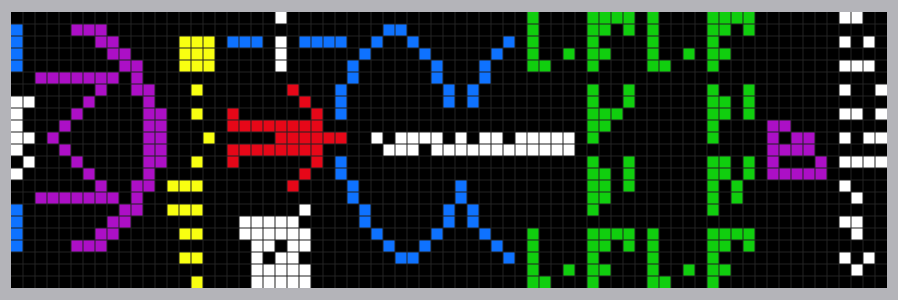
View the paper “The Benefits and Harm of Transmitting Into Space”
Deliberate and unintended radio transmissions from Earth propagate into space. Deliberate transmissions, such as the Arecibo message pictured above, are intended as attempts to send messages to potential extraterrestrial watchers (METI). Unintended radio leakage includes television and radio broadcasts, cell phone networks, and high-power military and astronomical radars. This radiation gives evidence of our technological civilization to any extraterrestrial watchers. This paper asks: do radio transmissions pose a risk and should they continue? The value of radio communication on Earth today is too large to justify ceasing all radio transmissions in order to reduce the risk of being found by a hypothetical harmful extraterrestrial civilization.
Most deliberate METI transmissions are detectable over much smaller volumes than the radio leakage. These transmissions are either short in duration or use a high bandwidth, in contrast to television carrier waves or high-power radars. These transmissions do not increase the probability of contact with extraterrestrial civilization. Such METI attempts are also valuable for education and public outreach efforts on Earth and for developing scientific groundwork for future METI projects. Given the modest costs associated with METI at low levels of detectability, we think that such projects should continue.
In contrast, high-power and persistent METI projects could have detectable volumes greater than the radio leakage, and would have a greater probability of being detected by any extraterrestrial watchers. The consequences of contact with extraterrestrials are highly uncertain, so we cannot say with confidence whether or not such attempts at METI should proceed. One additional benefit of transmitting messages into space at high power is that they serve a purpose analogous to digital time capsules, preserving the knowledge of human civilization, should our species become extinct. This may provide an additional justification for engaging in METI; however, the cost of maintaining such a long duration beacon must be weighed against the long-term benefits. Existing governing structures or treaties are currently lacking for METI. Active engagement in long-term METI would benefit from international cooperation in order to accurately represent Earth and humanity and to better understand how to communicate effectively with an unknown observer.
Academic citation
Haqq-Misra, Jacob, Michael W. Busch, Sanjoy M. Som, and Seth D. Baum, 2013. The benefits and harm of transmitting into space. Space Policy, vol. 29, no. 1 (February), pages 40-48, DOI 10.1016/j.spacepol.2012.11.006.
Image credit: Arne Nordmann
This blog post was published on 28 July 2020 as part of a website overhaul and backdated to reflect the time of the publication of the work referenced here.







